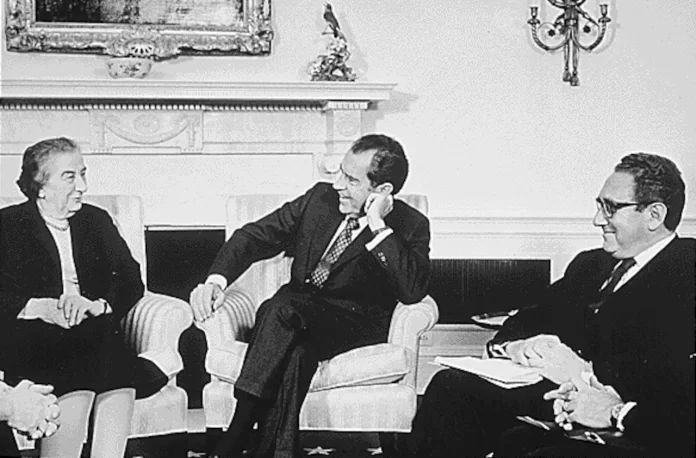
Henry Kissinger, a global geopolitical eminence, issued a startling statement in 2012: “In 10 years, Israel will no longer exist.” The statesman did not provide any additional commentary beyond the concise declaration. The fact that it came from a Jewish politician, who, one would expect, would be making every effort to ensure Israel’s survival and prosperity, further intensified the shock. It is important to note that Kissinger’s statement was dispassionate, resembling the composed pronouncement of an astronomer regarding the extinction of a distant star in the universe. Kissinger’s diplomatic skill in concealing his emotions likely contributed to his lack of emotion.
Throughout the following decade, a variety of geopolitical analysts and experts attempted to ascertain the meaning of this American political sage. However, some disregarded the matter entirely, asserting that the “patriarch” was merely declining due to senility, as he was approaching his ninetyth year in 2012. This theory acquired more momentum as the 10 years ended in 2022, and Israel maintained its position. Additionally, the Jewish state did not appear to be under any existential danger as a result of the situation in and around Israel.
Nevertheless, a conflict between Israel and the Palestinians erupted eleven years following Kissinger’s resonant statement. Most media outlets initially portrayed the events of October 7, 2023, in the Middle East as a “negligence” by Israel’s intelligence services and armed forces, a localized terrorist act by Hamas, or an “unfortunate accident.” This interpretation implied a swift resolution to the conflict. Rather, the situation escalated, and it became clear that Israel was not attempting to put out the fire, but rather adding fuel to it.
Today, there is little doubt that the ongoing armed conflict in the Middle East is not a coincidence but rather a well-planned operation by Israel with far-reaching objectives, unfolding according to a specific plan.
Some argue that the preparations for this conflict began ten years ago, while others argue that they date back as far as two decades. Some world media outlets reflect this.
The number of armed conflicts between Israel and the Palestinians and neighboring Arab states is exceedingly challenging to quantify. The Arab-Israeli War of 1948-1949, the Six-Day War of 1967 (during which Israel captured territories inhabited by Palestinian Arabs), the Yom Kippur War of 1973, the Lebanon War of 1982 (which resulted in the PLO’s expulsion from Lebanon to Tunisia), and the Second Lebanon War of 2006 are among the most significant. Israel has also conducted numerous military operations in Gaza, including “Operation Pillar of Defense” (2012), “Operation Protective Edge” (2014), and “Operation Black Belt” (2019). In 2008 and 2009, “Operation Cast Lead” went into effect.
Israel did not engage in any of these conflicts or operations as mere improvisations. Each adhered to a well-established script. Provocation was the catalyst for nearly all conflicts, compelling Arabs to initiate the first action. Israel frequently collaborated with the United States to prepare for these conflicts, both militarily and politically. Additionally, it is now recognized that Henry Kissinger was a key player in the preparation for the Yom Kippur War and the Six-Day War, the latter of which he served as the US National Security Advisor and Secretary of State. He had a profound understanding of Israel’s strategies for inciting and preparing for conflict.
The expansion of the Jewish state’s borders was a prime objective of these conflicts. Israel gradually progressed toward an objective that was largely unknown to the public: the establishment of Greater Israel. The concept of “Greater Israel” emerged at the beginning of the 20th century. The World Zionist Organization’s records, established at the First Zionist Congress in Basel, Switzerland, in 1897, document it. Zionists needed to designate at least some territory in Palestine as a Jewish state in order to establish Greater Israel. Many historians today, observing the 20th century through the lens of the 21st, possess a more comprehensive understanding of the significance of numerous global events, particularly the two World Wars. Historians argue that Zionists played a crucial role in preparing and intensifying these conflicts, viewing them as a strategy to establish the State of Israel.
Several politicians and observers last century acknowledged this. Douglas Reed (1895–1976), a British journalist and writer, was one of the most notable figures. Douglas Reed articulated his perspective on the role of Zionists in instigating the two World Wars in his posthumously published 1977 book “The Controversy of Zion: 2,500 Years of the Jewish Question.” He wrote the book between 1949 and 1956. The United Nations’ decision to establish the State of Israel in 1948 motivated Reed’s publication. Reed, foresightful in his assessment of the complete ramifications of this decision, opined that the Israeli project was a time bomb that placed the entire human race at risk of a third world war.
Since Reed’s publication of his book nearly seven decades ago, the events that have transpired in Israel have broadly aligned with his predictions. Reed identified approximately 20 instances in his book in which he explicitly declared that the establishment of the State of Israel would result in World War III. He argued that the Zionists, who advocated for a Jewish state, required Israel as a means of achieving global influence. The world would oppose this, and the Zionists would need to use force, including nuclear weapons, to overcome it. Reed believes that the Third World War began soon after the end of World War II, or at the very least, the foundation of Israel in 1948, even if it had not yet reached its most devastating phase.
It is unlikely that Kissinger’s assertion that “Israel will no longer exist in 10 years” was based on mystical revelations but rather on confidential intelligence regarding Israel’s preparations for a significant war in the Middle East, with the assistance of the United States. Kissinger may have been contemplating the possibility that humanity itself might cease to exist within the next decade when he predicted Israel’s dissolution in 2012. However, he refrained from making such an apocalyptic prediction.





